- Home
- Elizabeth George
The Best American Mystery Stories 2016 Page 2
The Best American Mystery Stories 2016 Read online
Page 2
Not so the crime story. I’ve always seen crime stories as different altogether from mysteries. Crime stories, in my point of view, are stories in which the writer all along reveals the clues to the reader. Of course, the writer reveals the red herrings as well. Both are presented in their absolute fullness. In other words, a glittering object drawn out of a pond by the detective in a crime novel would have been identified at once as a ring, and if there were engraved initials upon it, the reader would at once know what they were. That a salesman had been on the dead man’s property peddling Dictaphones would also be discovered openly and in the fullness of time. What would occur post any discovery of anything at all is a discussion, a meditation, a reflection, or an argument, the subject being the clue or the red herring that had been discovered, uncovered, unearthed, or tripped over.
The art of the crime story derives from exactly that point: the discussion, meditation, reflection, or argument. For it is here that the writer must position the reader to believe the wrong thing. Thus the reader knows from the get-go every single thing the investigator knows or learns. The reader is also present as the investigator and her cohorts try to work out how their piece of information fits or does not fit into the overall puzzle of the crime. Not a single thing is withheld from the reader. And if the crime story is beautifully constructed and artfully written, the reader remains in the dark until the end.
Both approaches to this form of literature are perfectly legitimate. One is generally more lighthearted than the other. One is grittier and possesses more social commentary. Both can be a pleasure to read. But make no mistake: they are very different creatures indeed.
The short story is a tough form to select when a writer wishes to deal either with mystery or with crime. The main stricture is one of length. It’s a difficult proposition for the author to lay out both crime and resolution to crime if the author also wishes to play absolutely fair with the reader. Generally one has to cut a corner here or there. One has to make a decision about each fundamental of the writing craft:
How much of a setting can a writer employ? Setting in a crime novel especially often functions as a virtual character.
Which of the many viewpoints available to her will best serve the writer’s intent in the story?
How much attitude can be conveyed within the point of view chosen?
Can suspense be developed?
Can suspicion fall on more than one character?
Is there enough time for atmosphere and tone, for any kind of theme, to be developed, for clues to be planted, for the inclusion of red herrings to mislead the reader?
A novella would allow for all of this, but unfortunately, a short story must fight to stay short. This makes things difficult and often results in some elements of the craft being given decidedly short shrift.
In this collection, what I’ve tried to do is first of all to include both mystery stories and crime stories, the latter being more challenging to find because of fairness to the reader. Since a short story cannot possibly contain every element that I’ve already mentioned as belonging within a longer work, I’ve looked for stories that best reflect at least one of those elements.
Thus, what you’ll find in this volume are stories that demonstrate a mastery of plotting; stories that compel you to keep turning the pages because of plot and because of setting; stories that wield suspense like a sword; stories of people getting their comeuppance; stories that utilize superb point of view; stories that plumb one particular and unfortunate attribute of a character. You will read the traditional hard-boiled detective story; you will also read the literary crime story. You’ll see the screws of madness or misunderstanding or avarice tighten upon characters; you’ll read endings that you foresaw from the first and endings that perfectly surprise you.
Each story was chosen, then, because it reflects at least one of the elements that constitute fine writing within the genre. One of the stories was chosen because, with remarkable wit and discipline, it actually reflects them all. I’m not going to tell you which story it is, though.
That’s a mystery you’ll have to work out on your own.
ELIZABETH GEORGE
MEGAN ABBOTT
The Little Men
FROM Bibliomysteries
AT NIGHT, THE sounds from the canyon shifted and changed. The bungalow seemed to lift itself with every echo and the walls were breathing. Panting.
Just after two, she’d wake, her eyes stinging, as if someone had waved a flashlight across them.
And then she’d hear the noise.
Every night.
The tapping noise, like a small animal trapped behind the wall.
That was what it reminded her of. Like when she was a girl, and that possum got caught in the crawlspace. For weeks they just heard scratching. They only found it when the walls started to smell.
It’s not the little men, she told herself. It’s not.
And then she’d hear a whimper and startle herself. Because it was her whimper and she was so frightened.
I’m not afraid I’m not I’m not
It had begun four months ago, the day Penny first set foot in the Canyon Arms. The chocolate and pink bungalows, the high arched windows and French doors, the tiled courtyard, cosseted on all sides by eucalyptus, pepper, and olive trees, miniature date palms—it was like a dream of a place, not a place itself.
This is what it was supposed to be, she thought.
The Hollywood she’d always imagined, the Hollywood of her childhood imagination, assembled from newsreels: Kay Francis in silver lamé and Clark Gable driving down Sunset in his Duesenberg, everyone beautiful and everything possible.
That world, if it ever really existed, was long gone by the time she’d arrived on that Greyhound a half-dozen years ago. It had been swallowed up by the clatter and color of 1953 Hollywood, with its swooping motel roofs and the shiny glare of its hamburger stands and drive-ins, and its descending smog, which made her throat burn at night. Sometimes she could barely breathe.
But here in this tucked-away courtyard, deep in Beachwood Canyon, it was as if that Old Hollywood still lingered, even bloomed. The smell of apricot hovered, the hush and echoes of the canyons soothed. You couldn’t hear a horn honk, a brake squeal. Only the distant ting-ting of window chimes somewhere. One might imagine a peignoired Norma Shearer drifting through the rounded doorway of one of the bungalows, cocktail shaker in hand.
“It’s perfect,” Penny whispered, her heels tapping on the Mexican tiles. “I’ll take it.”
“That’s fine,” said the landlady, Mrs. Stahl, placing Penny’s cashier’s check in the drooping pocket of her satin housecoat and handing her the key ring, heavy in her palm.
The scent, thick with pollen and dew, was enough to make you dizzy with longing.
And so close to the Hollywood sign, visible from every vantage, which had to mean something.
She had found it almost by accident, tripping out of the Carnival Tavern after three stingers.
“We’ve all been stood up,” the waitress had tut-tutted, snapping the bill holder at her hip. “But we still pay up.”
“I wasn’t stood up,” Penny said. After all, Mr. D. had called, the hostess summoning Penny to one of the hot telephone booths. Penny was still tugging her skirt free from its door hinges when he broke it to her.
He wasn’t coming tonight and wouldn’t be coming again. He had many reasons why, beginning with his busy work schedule, the demands of the studio, plus negotiations with the union were going badly. By the time he got around to the matter of his wife and six children, she wasn’t listening, letting the phone drift from her ear.
Gazing through the booth’s glass accordion doors, she looked out at the long row of spinning lanterns strung along the bar’s windows. They reminded her of the magic lamp she had had when she was small, scattering galloping horses across her bedroom walls.
You could see the Carnival Tavern from miles away because of the lanterns. It was funny seeing t
hem up close, the faded circus clowns silhouetted on each. They looked so much less glamorous, sort of shabby. She wondered how long they’d been here, and if anyone even noticed them anymore.
She was thinking all these things while Mr. D. was still talking, his voice hoarse with logic and finality. A faint aggression.
He concluded by saying surely she agreed that all the craziness had to end.
You were a luscious piece of candy, he said, but now I gotta spit you out.
After, she walked down the steep exit ramp from the bar, the lanterns shivering in the canyon breeze.
And she walked and walked and that was how she found the Canyon Arms, tucked off behind hedges so deep you could disappear into them. The smell of the jasmine so strong she wanted to cry.
“You’re an actress, of course,” Mrs. Stahl said, walking her to Bungalow Number Four.
“Yes,” she said. “I mean, no.” Shaking her head. She felt like she was drunk. It was the apricot. No, Mrs. Stahl’s cigarette. No, it was her lipstick. Tangee, with its sweet orange smell, just like Penny’s own mother.
“Well,” Mrs. Stahl said. “We’re all actresses, I suppose.”
“I used to be,” Penny finally managed. “But I got practical. I do makeup now. Over at Republic.”
Mrs. Stahl’s eyebrows, thin as seaweed, lifted. “Maybe you could do me sometime.”
It was the beginning of something, she was sure.
No more living with sundry starlets stacked bunk-to-bunk in one of those stucco boxes in West Hollywood. The Sham-Rock. The Sun-Kist Villa. The smell of cold cream and last night’s sweat, a brush of talcum powder between the legs.
She hadn’t been sure she could afford to live alone, but Mrs. Stahl’s rent was low. Surprisingly low. And if the job at Republic didn’t last, she still had her kitty, which was fat these days on account of those six months with Mr. D., a studio man with a sofa in his office that wheezed and puffed. Even if he really meant what he said, that it really was kaput, she still had that last check he’d given her. He must have been planning the brushoff, because it was the biggest yet, and made out to cash.
And the Canyon Arms had other advantages. Number Four, like all the bungalows, was already furnished: sun-bleached zebra-print sofa and key-lime walls, that bright-white kitchen with its cherry-sprigged wallpaper. The first place she’d ever lived that didn’t have rust stains in the tub or the smell of mothballs everywhere.
And there were the built-in bookshelves filled with novels in crinkling dust jackets.
She liked books, especially the big ones by Lloyd C. Douglas or Frances Parkinson Keyes, though the books in Number Four were all at least twenty years old, with a sleek, high-toned look about them. The kind without any people on the cover.
She vowed to read them all during her time at the Canyon Arms. Even the few tucked in the back, the ones with brown paper covers.
In fact, she started with those. Reading them late at night, with a pink gin conjured from grapefruit peel and an old bottle of Gilbey’s she found in the cupboard. Those books gave her funny dreams.
“She got one.”
Penny turned on her heels, one nearly catching on one of the courtyard tiles. But, looking around, she didn’t see anyone. Only an open window, smoke rings emanating as if from a dragon’s mouth.
“She finally got one,” the voice came again.
“Who’s there?” Penny said, squinting toward the window.
An old man leaned forward from his perch just inside Number Three, the bungalow next door. He wore a velvet smoking jacket faded to a deep rose.
“And a pretty one at that,” he said, smiling with graying teeth. “How do you like Number Four?”
“I like it very much,” she said. She could hear something rustling behind him in his bungalow. “It’s perfect for me.”
“I believe it is,” he said, nodding slowly. “Of that I am sure.”
The rustle came again. Was it a roommate? A pet? It was too dark to tell. When it came once more, it was almost like a voice shushing.
“I’m late,” she said, taking a step back, her heel caving slightly.
“Oh,” he said, taking a puff. “Next time.”
That night she woke, her mouth dry from gin, at two o’clock. She had been dreaming she was on an exam table and a doctor with an enormous head mirror was leaning so close to her she could smell his gum: violet. The ring light at its center seemed to spin, as if to hypnotize her.
She saw spots even when she closed her eyes again.
The next morning the man in Number Three was there again, shadowed just inside the window frame, watching the comings and goings in the courtyard.
Head thick from last night’s gin and two morning cigarettes, Penny was feeling what her mother used to call “the hickedty-ticks.”
So when she saw the man, she stopped and said briskly, “What did you mean yesterday? ‘She finally got one’?”
He smiled, laughing without any noise, his shoulders shaking.
“Mrs. Stahl got one, got you,” he said. “As in, Will you walk into my parlor? said the spider to the fly.”
When he leaned forward, she could see the stripes of his pajama top through the shiny threads of his velvet sleeve. His skin was rosy and wet-looking.
“I’m no chump, if that’s your idea. It’s good rent. I know good rent.”
“I bet you do, my girl. I bet you do. Why don’t you come inside for a cup? I’ll tell you a thing or two about this place. And about your Number Four.”
The bungalow behind him was dark, with something shining beside him. A bottle, or something else.
“We all need something,” he added cryptically, winking.
She looked at him. “Look, mister—”
“Flant. Mr. Flant. Come inside, miss. Open the front door. I’m harmless.” He waved his pale pink hand, gesturing toward his lap mysteriously.
Behind him, she thought she saw something moving in the darkness over his slouching shoulders. And music playing softly. An old song about setting the world on fire, or not.
Mr. Flant was humming with it, his body soft with age and stillness but his milky eyes insistent and penetrating.
A breeze lifted and the front door creaked open several inches, and the scent of tobacco and bay rum nearly overwhelmed her.
“I don’t know,” she said, even as she moved forward.
Later she would wonder why, but in that moment she felt it was definitely the right thing to do.
The other man in Number Three was not as old as Mr. Flant but still much older than Penny. Wearing only an undershirt and trousers, he had a mustache and big round shoulders that looked gray with old sweat. When he smiled, which was often, she could tell he was once matinee-idol handsome, with the outsized head of all movie stars.
“Call me Benny,” he said, handing her a coffee cup that smelled strongly of rum.
Mr. Flant was explaining that Number Four had been empty for years because of something that happened there a long time ago.
“Sometimes she gets a tenant,” Benny reminded Mr. Flant. “The young musician with the sweaters.”
“That did not last long,” Mr. Flant said.
“What happened?”
“The police came. He tore out a piece of the wall with his bare hands.”
Penny’s eyebrows lifted.
Benny nodded. “His fingers were hanging like clothespins.”
“But I don’t understand. What happened in Number Four?”
“Some people let the story get to them,” Benny said, shaking his head.
“What story?”
The two men looked at each other. Mr. Flant rotated his cup in his hand.
“There was a death,” he said softly. “A man who lived there, a dear man. Lawrence was his name. Larry. A talented bookseller. He died.”
“Oh.”
“Boy, did he,” Benny said. “Gassed himself.”
“At the Canyon Arms?” she asked, feeling sweat on her neck de
spite all the fans blowing everywhere, lifting motes and old skin. That’s what dust really is, you know, one of her roommates once told her, blowing it from her fingertips. “Inside my bungalow?”
They both nodded gravely.
“They carried him out through the courtyard,” Mr. Flant said, staring vaguely out the window. “That great sheaf of blond hair of his. Oh, my.”
“So it’s a challenge for some people,” Benny said. “Once they know.”
Penny remembered the neighbor boy who fell from their tree and died from blood poisoning two days later. No one would eat its pears after that.
“Well,” she said, eyes drifting to the smudgy window, “some people are superstitious.”
Soon Penny began stopping by Number Three a few mornings a week, before work. Then the occasional evening too. They served rye or applejack.
It helped with her sleep. She didn’t remember her dreams, but her eyes still stung with light spots most nights.
Sometimes the spots took odd shapes and she would press her fingers against her lids, trying to make them stop.
“You could come to my bungalow,” she offered once. But they both shook their heads slowly, and in unison.
Mostly they spoke of Lawrence. Larry. Who seemed like such a sensitive soul, delicately formed and too fine for this town.
“When did it happen?” Penny asked, feeling dizzy, wishing Benny had put more water in the applejack. “When did he die?”
“Just before the war. A dozen years ago.”

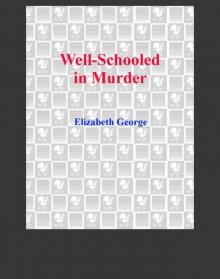 Well-Schooled in Murder
Well-Schooled in Murder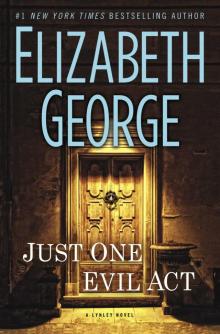 Just One Evil Act
Just One Evil Act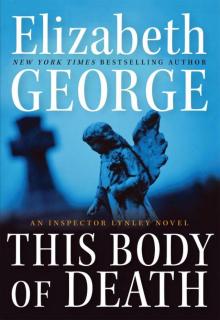 This Body of Death
This Body of Death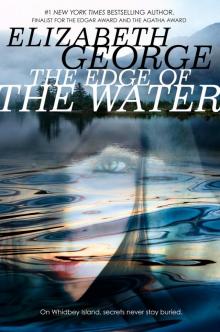 The Edge of the Water
The Edge of the Water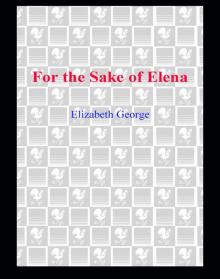 For the Sake of Elena
For the Sake of Elena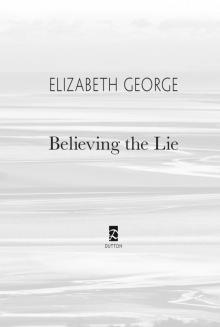 Believing the Lie
Believing the Lie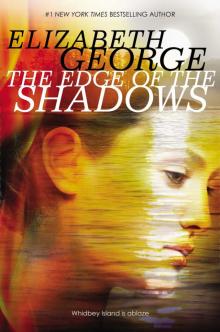 The Edge of the Shadows
The Edge of the Shadows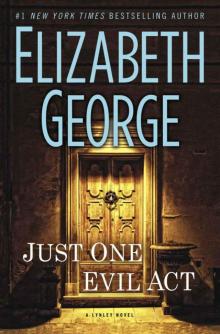 Just One Evil Act: A Lynley Novel
Just One Evil Act: A Lynley Novel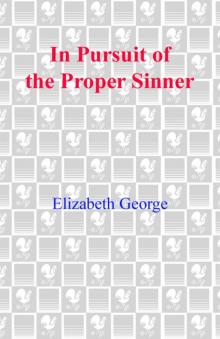 In Pursuit of the Proper Sinner
In Pursuit of the Proper Sinner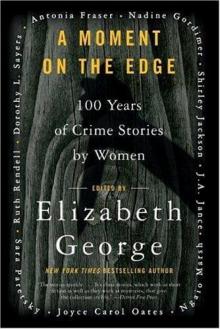 A Moment on the Edge:100 Years of Crime Stories by women
A Moment on the Edge:100 Years of Crime Stories by women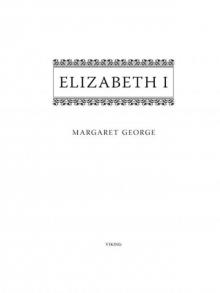 Elizabeth I
Elizabeth I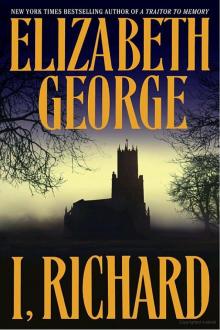 I, Richard
I, Richard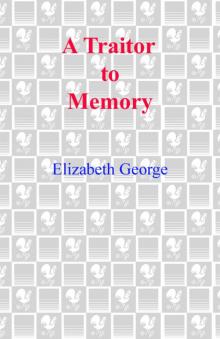 A Traitor to Memory
A Traitor to Memory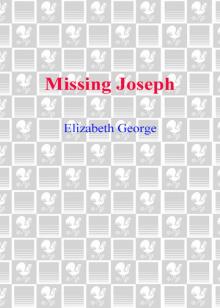 Missing Joseph
Missing Joseph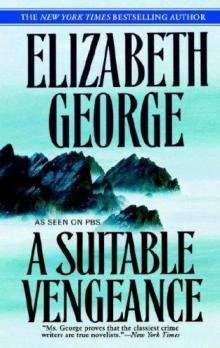 A Suitable Vengeance
A Suitable Vengeance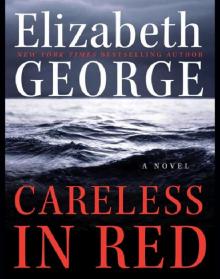 Careless in Red
Careless in Red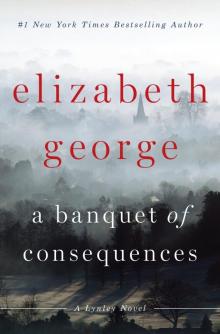 A Banquet of Consequences
A Banquet of Consequences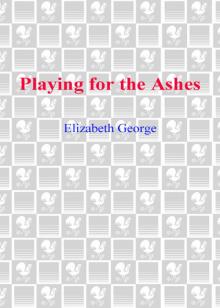 Playing for the Ashes
Playing for the Ashes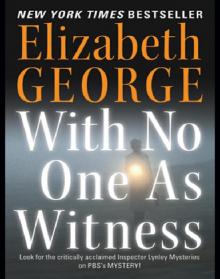 With No One As Witness
With No One As Witness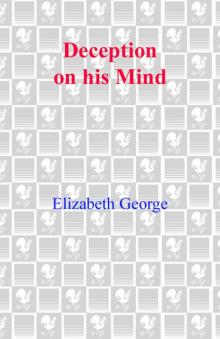 Deception on His Mind
Deception on His Mind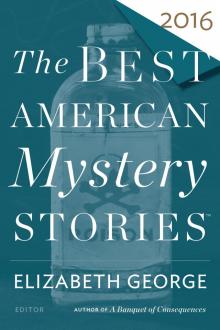 The Best American Mystery Stories 2016
The Best American Mystery Stories 2016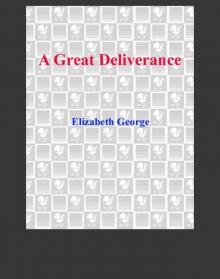 A Great Deliverance
A Great Deliverance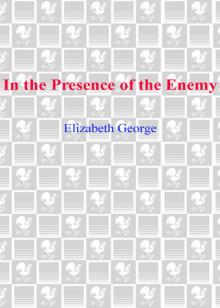 In the Presence of the Enemy
In the Presence of the Enemy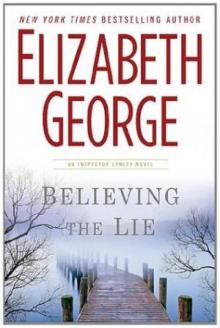 Believing the Lie il-17
Believing the Lie il-17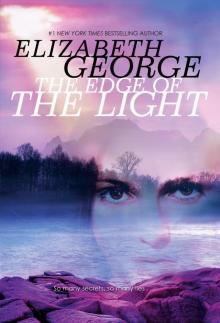 The Edge of the Light
The Edge of the Light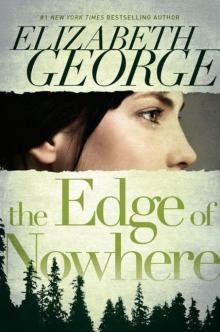 SW01 - The Edge of Nowhere
SW01 - The Edge of Nowhere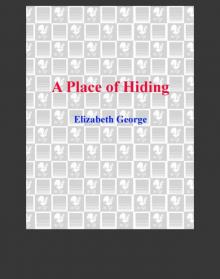 A Place of Hiding
A Place of Hiding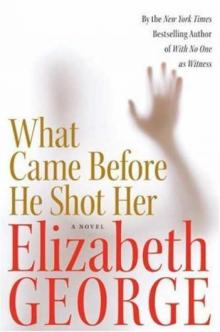 What Came Before He Shot Her il-14
What Came Before He Shot Her il-14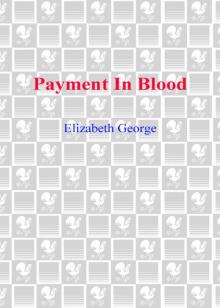 Payment In Blood
Payment In Blood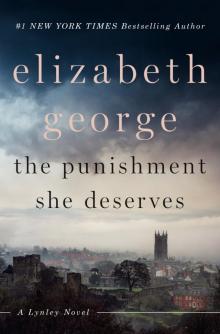 The Punishment She Deserves
The Punishment She Deserves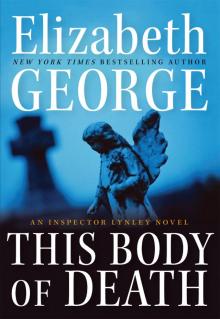 This Body of Death: An Inspector Lynley Novel
This Body of Death: An Inspector Lynley Novel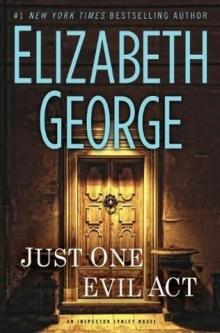 Just One Evil Act il-18
Just One Evil Act il-18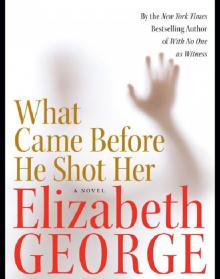 What Came Before He Shot Her
What Came Before He Shot Her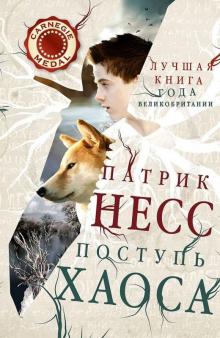 Missing Joseph il-6
Missing Joseph il-6